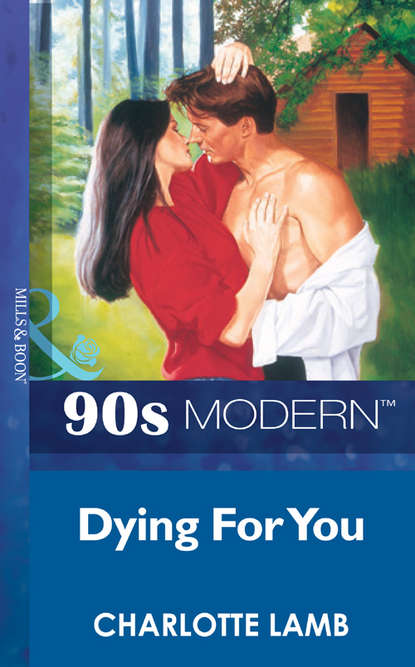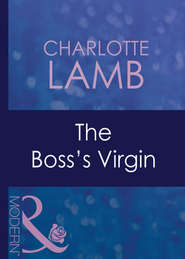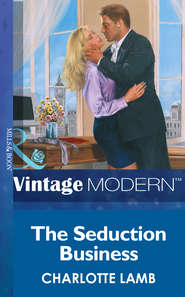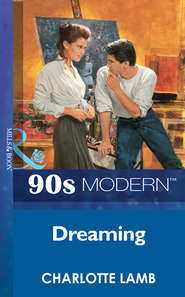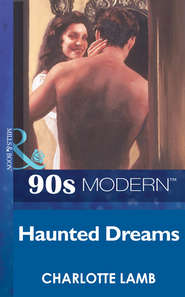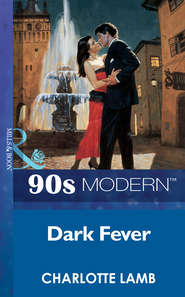По всем вопросам обращайтесь на: info@litportal.ru
(©) 2003-2025.
✖
Dying For You
Автор
Год написания книги
2018
Настройки чтения
Размер шрифта
Высота строк
Поля
He didn’t reply, and when she looked into the driving mirror above his head she couldn’t see his eyes, only the olive-skinned curve of his profile turned away from her, the gleam of black hair above that. He had a strong, fleshless nose, powerful cheekbones. It was a tough face; Annie searched what she could see of it, trying to assess the sort of man this was, what he might plan to do to her.
‘Have we met before?’ she asked, but there was still no reply. She pretended to laugh, trying to hide her alarm. ‘I’m sorry not to recognise you, but I meet so many people, it’s hard to remember all their faces. Fans are always waiting after concerts, asking for autographs, talking to me—is that where we met? Are you a fan?’
He didn’t look like a fan, though. She didn’t really believe he was. Her fans were usually in their teens, or early twenties; they wore the same sort of clothes, same hairstyles, immediately recognisable as the latest street trend. Many of the girls dressed like her, actually, even to having black nails and lipstick, although that was something she had only done briefly, a year or so ago, and no longer did. She’d got bored with that.
This man was too old to be one of her fans. He had to be in his thirties and she thought his clothes were old-fashioned: that dark suit, the white shirt, the dark tie. Now that she focused on his clothes she began to realise what good quality they were: the suit looked as if it might have been tailor-made. It was certainly expensive; it hadn’t come off a peg in a shop. The shirt and tie, too, looked classy, from what she had seen of them.
The clothes puzzled her. Clothes usually told you something about the person wearing them, and the message she got from what he wore was that he was respectable, conventional, yet what he was doing was neither of those things.
So he wasn’t a typical kidnapper, either, although who knew what they would look like? This might, in fact, be a clever disguise meant to make him invisible, anonymous, someone police would discount as a possible suspect.
His silence was unnerving. Swallowing nervously, she tried, again, to get him to talk to her.
‘Why won’t you tell me who you are?’
‘Later,’ he said without looking in her direction, his eyes fixed steadily on the road ahead.
She broke out, ‘Well, where are you taking me?’
‘You’ll see, when we get there.’
‘Tell me now.’ She tried to sound cool, calm, unflustered, unafraid, but her throat was dry and her mouth moved stiffly.
He didn’t answer.
She shifted on the seat and could see his hands on the wheel: firm, capable hands, long-fingered, the skin tanned. They had a strength that worried her. Annie looked sideways out of the window at the green French countryside. Spring was only just beginning, a few new leaves appearing on the trees. The sky was blue but the sun wasn’t hot. Where had he been to get that tan?
And then another thought occurred to her. She had noted a faint foreign accent right from that first phone call—was he French? Or some other nationality? Had he just arrived from another country, somewhere hot? Sicily? she wondered. Hadn’t she heard that Sicilian shepherds often kidnapped people and held them to ransom? That it was a family trade? She looked at the driver’s black hair and olive skin. He could be Italian. But she was going to Italy later on the tour; why hadn’t he waited until she got there? Why snatch her in Paris?
‘Are you kidnapping me?’ she asked, and caught the dark flash of his eyes again as he looked at her in his driving mirror.
He still didn’t say anything, though, which in itself was disturbing, because not to answer was a sort of admission. It meant he wasn’t denying it, at the very least.
She burst out huskily, ‘People will soon be looking for me, you know.’
His face stayed averted; he didn’t respond.
‘There are a whole group of us coming to Paris—my agent, the band, the tour manger... If I don’t arrive at my hotel they’ll call the police.’
He shrugged indifferently, but she kept trying to make him see sense.
‘You can’t just snatch someone without anybody noticing! When they check up with the airport they’ll find out that a car collected me. Plenty of people saw me getting into your car, including the security men who flew from London with me. They saw you; they’ll have noticed the number of your car.’
Would they have done, though? They had talked to him, certainly, had looked at his car, but would they have thought of looking at the number of the black limousine? There hadn’t been many other people around, either; if anyone had been watching they would have been looking at her, because she had been escorted out to the car by security men and airport officials eager to avoid any problems with the media.
She wasn’t yet a big name in Europe, though. The Press wouldn’t have been over-excited by her arrival. She was just starting to sell records there, so she wasn’t likely to be big news, but with a concert tour starting a week later there might have been Press interest, so the airport hadn’t taken any chances.
That reminded her of something. ‘There was a limousine booked,’ she said slowly. ‘Was that you? Are you from the limousine firm? Because if you are, the police will track you down at once.’
He laughed.
Annie’s nerves grated. ‘Why are you doing this?’ she asked him angrily, then something occurred to her and in a sudden pang of hope she asked, ‘This isn’t some elaborate joke, is it? I haven’t been set up? Are you taking me to meet Phil and Di somewhere? Is this one of Phil’s practical jokes?’
Phil was famous for practical jokes; the idea should have occurred to her before if she hadn’t been so unbalanced by recognising the voice that had made all those phone calls.
‘No, it isn’t a joke, Annie,’ he said, and the way he said it made the panic start up again.
She couldn’t breathe; she lay back against the upholstery, fighting to keep calm, fighting to breathe naturally. She closed her eyes and tried to shut out everything else, to stabilise herself.
There was no point in losing control. There was nothing she could do at that moment; she was locked inside this car behind smoky glass windows which would hide her from anyone looking in from outside, so that she couldn’t even attract attention by waving or screaming. She would just have to sit here and wait until they arrived at wherever he was taking her.
Her heart missed a beat. What would happen then? If only she knew what he meant to do to her. He didn’t look like a dangerous lunatic, or a criminal; in fact she had to admit he was strikingly attractive, if you liked Mediterranean colouring: the olive skin and black hair and dark, gleaming eyes. She always had, but then she had French blood, through her father, who had been born in France, of French descent, although he had spent most of his life in England.
Annie had only visited France a couple of times herself. It had been the one country she wanted to visit as soon as she started travelling with the band. She had never been there while her father was alive, and she had promised herself she would one day go in search of the place where he had been born, in the Jura mountains, but there had never been time so far for such a long trip. When you were giving concerts you did the gig and moved on, unfortunately.
Her father had been dark and olive-skinned with dark eyes, like this man. He hadn’t been tall, though; and he had been slightly built, not powerful. Annie’s long black hair had been inherited from him, but she had been born with her mother’s skin colour and green eyes. As a child she had often wished she had inherited her mother’s blonde hair, too, but now she was glad she was a mix of both parents. She wished now that she were even more like her father.
She had adored her father, and his death when she was eleven had darkened her childhood, especially when her mother married again within a year. Annie had never liked her stepfather, and made no effort to hide her hostility; and Bernard Tyler had soon come to dislike her too. So had her mother.
Joyce Tyler knew her daughter condemned her for marrying again so soon after her first husband’s death, and resented Annie’s open contempt. She had twin sons a couple of years later, and became totally engrossed in them. She had always been a man’s woman, never unkind, but largely indifferent to her daughter; now she was only interested in her sons.
When Bernard Tyler began slapping Annie around, Joyce Tyler did nothing to stop him. In fact she bluntly told Annie it served her right. ‘If you were nice to him, he’d be nice to you. You only have yourself to blame.’
By then fourteen, Annie began staying out of the house as much as possible, because she was afraid of Bernard Tyler as well as disliking him. She started living for the day when she would be old enough to leave home for good. When she met Philip and he offered her a career in music she packed a case with everything she valued and left, knowing that her mother wouldn’t even think about her again, and that Bernard and his two sons would be glad to see her go.
When she began to be well-known they had got in touch with her to ask her to lend them some money, offering a long, rambling story about financial hardship as an excuse, but Philip had dealt with that, as he did with all her financial affairs. They had been given tickets for a concert soon afterwards, and Annie had seen them briefly that night, but then they had vanished again, no doubt because Philip made it clear that he wasn’t paying them any more large sums of money; and she had been relieved, yet that reminder of past misery had made her unhappy for days.
Her life would have been so different if her father hadn’t died so young, her mother hadn’t then married Bernard Tyler. Annie’s happy childhood had ended at the age of eleven; until she was seventeen she had been lonely and un-happy. Even to remember those years now was to feel greyness steal over her. She frowned, pushing the memories away.
‘You’re very quiet,’ the driver said, and she started, looking at him again, but all she could see was his profile and the dark sweep of his lashes.
‘I was thinking. My friends are going to be very upset and worried when I don’t arrive. They’ll wonder what on earth has happened to me.’
‘They’ll soon find out.’ His voice was cool, dismissive, and she flinched.
‘What does that mean? Will you ring them?’ Saying what, though? Telling them that she had been kidnapped and they would have to pay a large ransom to get her back?
She wished she could see his face properly instead of merely getting glimpses now and then. People’s eyes usually told you a lot about them, but that wasn’t true about this man. His eyes were like bottomless wells: deep, lustrous, impossible to plumb. And yet she was beginning to feel an odd teasing familiarity...
Had they ever met before? she wondered. Or had he cleverly managed to plant the idea that she knew him in her head subliminally, with his phone calls, and ever since he picked her up at the airport?
The limousine slowed, turned at right angles, and left the road on which they had been travelling. Annie looked out and upwards, seeing that they were driving between deep, sunk green banks from which trees and bushes sprang, over a winding, unmade road.
No! she realised; this wasn’t a road—it was a driveway leading up to a house. A moment later the house itself came into view: not a large house, but detached, with trees and a garden around it, two-storeyed, with mossy pink tiles on the roof, the walls painted white and the closed shutters over every window painted black.
As the car halted outside the front door Annie tried to make out whether there were any other houses in view, and felt her heart sink as she saw that the white house stood on the edge of some sort of wood, which lay behind it, and that there were only fields in front of it. It could hardly have been more isolated. She couldn’t see another house anywhere.
Nerves jumped under her skin. She bit her lip, feeling real fear growing inside her.





